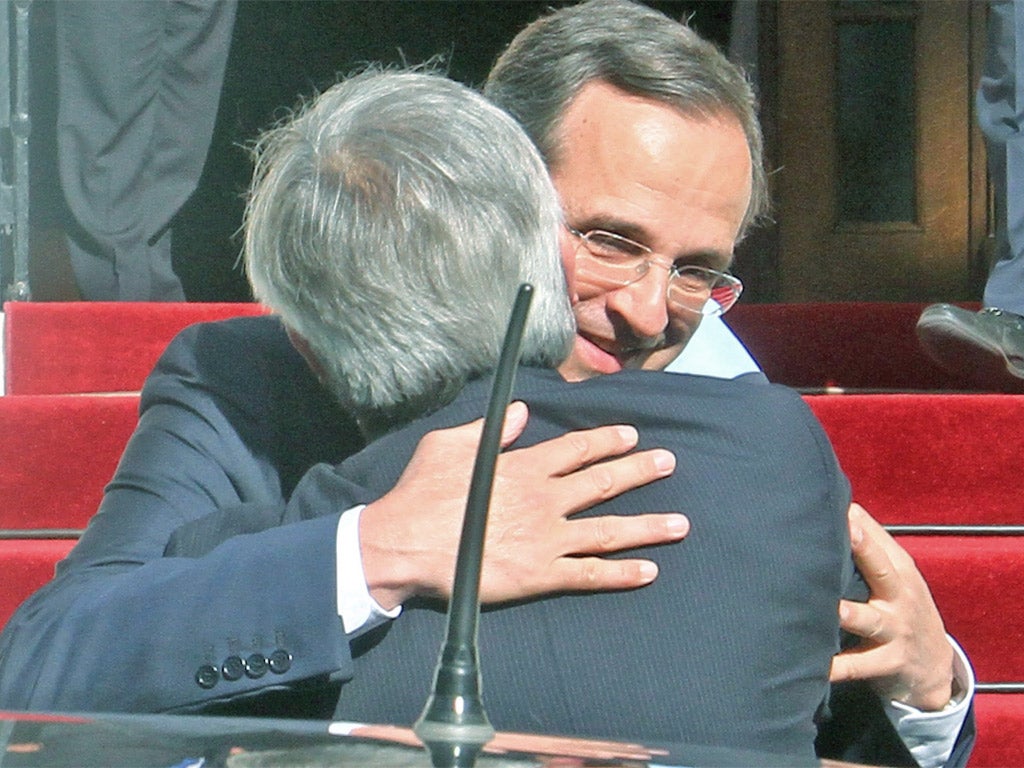Your support helps us to tell the story
From reproductive rights to climate change to Big Tech, The Independent is on the ground when the story is developing. Whether it's investigating the financials of Elon Musk's pro-Trump PAC or producing our latest documentary, 'The A Word', which shines a light on the American women fighting for reproductive rights, we know how important it is to parse out the facts from the messaging.
At such a critical moment in US history, we need reporters on the ground. Your donation allows us to keep sending journalists to speak to both sides of the story.
The Independent is trusted by Americans across the entire political spectrum. And unlike many other quality news outlets, we choose not to lock Americans out of our reporting and analysis with paywalls. We believe quality journalism should be available to everyone, paid for by those who can afford it.
Your support makes all the difference.The German Chancellor Angela Merkel yesterday gave a frosty reception to Greece's request for more time to meet the conditions of its sovereign bailout and the Eurogroup president, Jean-Claude Junker, warned the country was on its "last chance" to make good on its reform promises.
The Greek Prime Minister, Antonis Samaras, met Mr Junker in Athens yesterday as he kicked off his diplomatic campaign to secure more "breathing space" for his country to meet its commitments to cut spending, collect more taxes and reform its labour markets. "The ball is in the Greek court – in fact this is the last chance and Greek citizens have to know this," said Mr Junker at a press conference with Mr Samaras.
Mr Samaras, who has led Greece's coalition government since June, will travel to Berlin on Friday to meet Ms Merkel to make the same request for leeway. He hopes to persuade the country's European partners to give it an extra two years to implement its commitments on the grounds that the economy is shrinking more quickly than anyone expected.
"All we want is a bit of 'air to breathe' to get the economy running and to increase state income," he wrote in Germany's Bild newspaper yesterday. Mr Samaras also played down suggestions that Greece would be asking for an additional bailout on top of the €170bn pledged to it by the International Monetary Fund (IMF) and other European governments since May 2010 to avoid bankruptcy.
Yet Ms Merkel warned that no decision would be taken over Greece before September. "We await the report of the Troika," she said, referring to the inspectors from the European Commission, the European Central Bank and the IMF who must judge whether Greece is living up to its promises.
The Troika is due to decide next month whether the next instalment of the bailout package, worth €31.5bn, should be released. Mr Samaras said Greece could survive if the money was delayed by a month, but not much longer. "Theoretically we could bridge the time. But if we don't get the tranche at all Greece is broke," he told the Süddeutsche Zeitung newspaper.
Greece's economy is in its fifth successive year of recession and the unemployment rate has hit 23 per cent. The IMF has forecast that it will contract by 4.7 per cent in 2012. But Athens thinks the slump over the year will be closer to 7 per cent.
Mr Samaras has identified €11.5bn in spending cuts to be delivered between 2013 and 2015 to bring Greece's budget deficit below 3 per cent of GDP. But the Troika is also reported to be on the verge of ordering Athens to identify a further €2bn in cuts to meet its deficit reduction commitments, something which has prompted Mr Samaras to request more time.
Ms Merkel, meanwhile, is under growing domestic pressure not to approve more fiscal leeway. Some members of her own governing coalition have suggested that Greece should be ejected from the single currency, casting doubt over whether she could get assistance for Greece past her own parliament. But some analysts have suggested that Ms Merkel might be able to assist Greece without holding a new vote in the Bundestag. "Within the existing Greek programme envelope, the EFSF [the European bailout fund] could disburse aid instalments earlier to cover additional near-term financing gaps. Furthermore, interest rates on official aid could be cut, or payments postponed," said Christian Schulz of Berenberg Bank.
After meeting Ms Merkel on Friday, Mr Samaras will meet the French president, François Hollande, who is believed to be more sympathetic to Greece's request to be granted more time to meet its commitments.
Now Germany can borrow for nothing
Nervous investors parked their cash with Germany for nothing yesterday, with Berlin attracting reasonable demand at a sale of €4bn of new interest-free two-year bonds. The IOUs came with a zero coupon – meaning Germany pays no interest to the holder – for the second time this year, reflecting a fall in the country's borrowing costs to historic lows as the euro zone debt crisis threatened to engulf Spain and Italy.
While the prospect of the European Central Bank buying Spanish and Italian bonds to curb the two countries' borrowing costs has improved appetite for riskier assets, doubts over the size and timing of any intervention has ensured underlying demand for German debt. Reuters

Join our commenting forum
Join thought-provoking conversations, follow other Independent readers and see their replies
Comments